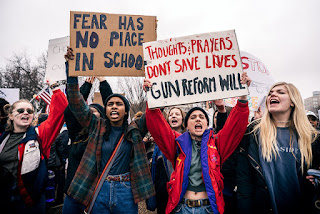Talking about Parkland with My 5th Graders
I don’t have any thoughts to share regarding the latest school shooting. At least nothing to add to the array of pieces by other educators eloquently communicating our heartbroken exhaustion with our country’s apathy toward the murder of its youngest citizens.
I’ve been on vacation the last week. So as I get ready to return I’m thinking about how to discuss the activism of the Parkland student community.
Since I switched schools I’ve found myself discussing current events a lot less. At my previous school I talked about current events with my 3rd graders constantly. Whether it was terrorist attacks in Brussels, #OscarsSoWhite, or Black Lives Matter, we talked about pretty much every major news story of the year. But that’s partly because my students brought these stories to morning meeting, and I felt compelled to help them process them and to feel safe and empowered. If I raised a topic, I felt confident that a decent number of my students would know what I was talking about.
 |
| Lorie Shaull https://www.flickr.com/photos/number7cloud/40369207261 |
At my current school, even though my kids are older, my students feel very disconnected from current events. I remember first learning this in September 2016 when I wanted to discuss the protests in Charlotte in the wake of the police shooting of Keith Lamont Scott. I started the conversation by asking the kids what they already knew. When I did, I found none of them had heard of it. I opted then not to go into it. I worried that I would be unnecessarily bringing in a tragic and traumatic story to kids who are already dealing with a disproportionate amount of trauma already.
I have erred on the side of silence/caution since that day. We talked about Donald Trump’s election, but we haven’t talked about many particular events since. For whatever reason, my students at PS 194 do not seem "plugged in" to the news.
As my students head toward middle school I am considering rethinking this stance.
For starters, they are older and (somewhat) more mature. So I think they are better able to handle difficult topics. But also I am questioning if my protectiveness is coming from a paternalistic place. In other words, was I wrong to assume they needed “sheltering?” Rather than protecting them, am I cutting them off from being fully informed and engaging civically?
I suspect the answer is somewhere in the middle. We live in a country that already does so much to rob children of color of their childhoods and innocence. I do not want to unnecessarily traumatize them. But I do want to equip them with information they need to make sense of and respond to this messed up world.
My students are compassionate, creative, and committed to justice. I believe if I can find a way to responsibly bring up current events like the Parkland shooting, good conversation can come out of it. I think my students deserve to know more about the world around them, and if the Stoneman Douglas students have taught us anything, it's that we all could benefit from whatever ideas my students have to create a better world.

Comments